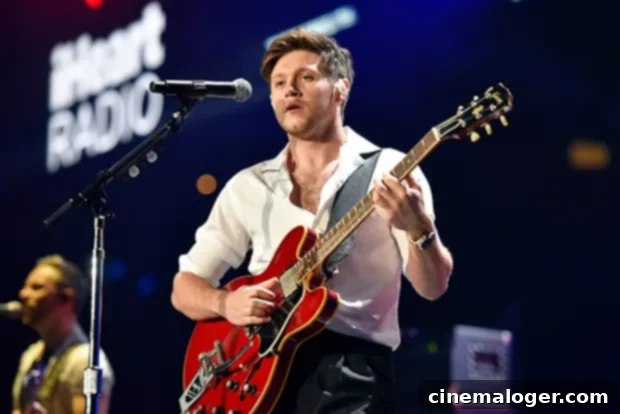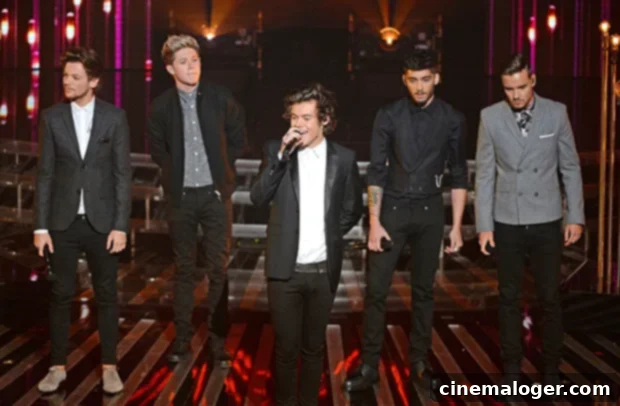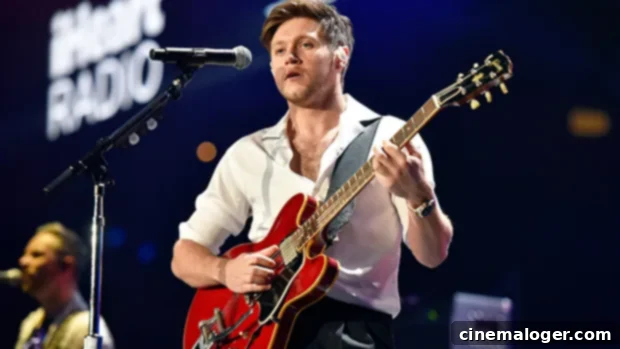Niall Horan Opens Up: The Unseen Prison of One Direction’s Global Fame
In a startling revelation that pulls back the curtain on the often-glamorized world of global superstardom, former One Direction member Niall Horan recently offered a candid look into his experiences during the boy band’s meteoric rise. Comparing the height of their fame to a form of imprisonment, Horan shed light on the immense pressures and the profound lack of personal freedom that accompanied their unprecedented success. His honest reflections underscore the complex and often isolating reality faced by young artists propelled into the white-hot spotlight.
The 27-year-old singer, who shot to international prominence as one-fifth of One Direction, the biggest band in the world at the peak of their career, shared these profound insights during the March 23 episode of People, Just People with host Dermot O’Leary. It was during this conversation that Horan dropped the impactful comparison, describing his experience as akin to being “a prisoner.” This striking analogy immediately resonated with fans and commentators alike, offering a fresh, and somewhat somber, perspective on a period often remembered for its overwhelming joy and global adoration. He articulated the deeply felt frustration, explaining, “I struggled with the idea of, ‘Why won’t you just let us out?'” This sentiment painted a vivid picture of constant surveillance and a desperate yearning for normalcy.
Horan vividly recalled instances where their privacy was completely eroded, detailing how enthusiastic fans would be “banging on car windows [before we could get out of the vehicle].” This relentless pursuit meant that even the simplest desires, like taking a stroll, became impossible luxuries. “[I was thinking], ‘We just want to go for a walk,’ you know?” he expressed, encapsulating the profound disconnect between their public persona and their private wishes. The sheer scale of One Direction’s popularity meant that ordinary activities were replaced by a constant state of vigilance, transforming everyday outings into intricate security operations.

The band, which also featured the talents of Harry Styles, Liam Payne, Louis Tomlinson, and Zayn Malik, first captured hearts and minds during the 2010 season of The X Factor. Their formation on the show was serendipitous, leading to an almost instantaneous explosion of fame. Within mere months, they had cultivated an immense international fan base, unprecedented in its devotion and reach. This rapid ascent meant that the young men, many still in their teens, were thrust into a world of non-stop touring, recording, and public appearances, with little time to process the magnitude of their new reality.
Niall’s recollection of their early fame highlights the overwhelming nature of such sudden celebrity. “You can’t get inside the brain of a fan and now I completely get it, but at the time, you’re like, ‘You’re our age. Just let us out,” Niall articulated, capturing the youthful frustration of being unable to live a normal life. He wished he could have simply said, “[I wanted to say], ‘We just want to walk down the street. You must understand.'” This desire for basic human freedom was a constant, gnawing presence amidst the whirlwind of sold-out stadiums and screaming fans. The paradox of being adored by millions yet feeling entirely isolated from the general public was a heavy burden for the burgeoning superstars.
The constraints on their personal lives became particularly evident during their extensive tours. Niall recounted how, during the band’s first stadium tour, the “Where We Are” tour, which spanned from April to October 2014, they were largely unable to explore the vibrant cities they visited. This massive undertaking took them across continents, performing for legions of fans in iconic venues. Yet, the reality behind the scenes was far less glamorous than the postcard images of global travel might suggest. Instead of sightseeing and experiencing local cultures, their days were often confined to hotels and venues, dictated by rigorous schedules and stringent security protocols.
“[I vividly recall being in] all these amazing cities, but not being able to see them [because fans would surround our hotel],” Niall lamented, painting a poignant picture of missed opportunities and enforced isolation. He elaborated on the sheer scale of the crowds that would gather, stating, “The police had done a headcount and there were 10,000 people in the street the whole time.” This kind of constant, overwhelming presence transformed their hotels from temporary homes into fortresses, designed to keep them safe but inadvertently trapping them within. The windows offered only a glimpse of the outside world, a world they were famous in but could not truly inhabit.
The relentless demands of their schedule and the profound lack of privacy ultimately took their toll, leading to the band’s disbandment in 2015. Despite going their separate ways, the British hitmakers still command an incredibly passionate following, a testament to the enduring power of their music and the profound connection they forged with their fan base. The passage of time has done little to diminish the fervor of One Direction’s dedicated followers, who eagerly follow the solo careers of each member and hold onto hope for a potential reunion. The legacy of their bond and their collective impact remains a significant force in pop culture, even years after their last performance together.
This unwavering devotion was dramatically highlighted recently when fans collectively “freaked out” after photos emerged supposedly showing Harry Styles and Niall Horan going on a hike together. The prospect of any interaction between the former bandmates sends ripples of excitement through their community, demonstrating the deep emotional investment fans still have in their idols. The rarity of such public appearances only amplifies their significance, transforming what would be an ordinary outing for most into a monumental event for millions.

Indeed, the five men rarely interact with each other publicly, making any perceived reunion a cause for celebration. Thus, a photo which appeared to show the duo together instantly sent their dedicated fan base into overdrive. The snap featured two men wearing activewear, and while their faces weren’t explicitly visible, their outfits strongly resembled looks that both Harry and Niall had been seen wearing recently. This small hint was enough to ignite a firestorm of speculation and joy, illustrating the unique power and vigilance of their loyal following, who meticulously track every detail of their idols’ lives. For fans, these moments are not just about celebrity sightings; they represent a continuation of the bond they felt with the band as a whole.
Niall Horan’s poignant comparison of his time in One Direction to being a “prisoner” serves as a powerful reminder of the hidden costs of unimaginable fame. While the adulation and success were monumental, they came at the expense of personal freedom and the simple joys of everyday life. His reflections offer a valuable insight into the psychological landscape of global pop stars, challenging the simplistic narrative of constant glamour and effortless stardom. It underscores the importance of understanding the human experience behind the celebrity facade, and the profound impact that an all-consuming public life can have on young individuals grappling with identity, privacy, and the relentless demands of an extraordinary career. The journey from an aspiring singer on a talent show to a global phenomenon locked within a gilded cage is a narrative that continues to fascin resonate, reminding us that even in the brightest lights, shadows of confinement can exist.
